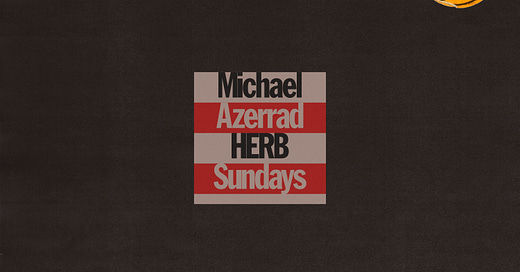Herb Sundays 108: Michael Azerrad
The acclaimed author and journalist shares a time capsule of an era of music that inspired him.
Herb Sundays 108: Michael Azerrad. (Apple, Spotify).
Art by Michael Cina
“In the early-to-mid 2000s, I was pretty disenchanted with contemporary rock music — so many of the hippest new bands were recycling music that I had listened to at least 20 years earlier (and, in my opinion, not doing it particularly well). Then, in 2007, I discovered Dirty Projectors and I was reborn. The DPs soon became my friends and introduced me to a ton of great music, mostly by their friends, many of whom became my friends too. So I made a playlist of those bands — an incredible extended tribe — because their music represents a pivotal time in my life, and for that I'll be eternally grateful.” - Michael Azerrad
Michael Azerrad is the author of The Amplified Come As You Are (HarperOne, 2023), an extensively re-investigated version of his 1993 Nirvana biography Come as You Are: The Story of Nirvana, and Our Band Could Be Your Life: Scenes from the American Indie Underground 1981-1991 (Little, Brown, 2001). A former contributing editor for Rolling Stone, he has also written for the New Yorker, the Wall Street Journal, the Yale Review, the New York Times, amongst others. He was the founding editor of eMusic, and edited Bob Mould's autobiography See a Little Light: The Trail of Rage and Melody (Little, Brown, 2011). He's also an “avid hiker, an enjoyer of pre-1970s movies, and a fan of every animal.”
I’ll admit to being late to the game on the great Michael Azerrad, but there’s no time like the present. Or maybe I wasn’t, I just didn’t know enough to know who he was. I vaguely remember reading some of Come As You Are around when it came out as a teen, but it’s sort of a blur. I met Azerrad for the first and only time at an awards thing years back, where my colleague Amanda Colbenson introduced me to him. He was slight and professorial, where in my mind, I maybe attached his name to a more “punk” looking guy.
Azerrad has a very natural and lean writing style; it has no superfluous edges but is inviting and kind. I also love how generous he is in praising other writers and books (a Herb attribute, I believe). I'm reading the new version of Come As You Are, which is not just a cleaned-up edition but a fascinating dialogue between past and present. Azerrad investigates his relationship with Cobain, his chosen profession, and yet remains comfortable writing alongside the original text, leaving enough room to doubt himself and his subjects openly. It's now not just a book about Nirvana but also about life itself, the nature of memory, and the passing of time.
The obvious thing that occurred to me when writing this was how Azerrad’s two most famous books, Come As You Are, and Our Band Could Be Your Life, is how they speak to each other. Sure, Nirvana’s emergence is largely touted as the Underground wresting control of the Mainstream, like a signal hijacking, but Azerrad has also documented the tectonic conditions that allowed that to be, so Our Band is sort of a prequel to the Nirvana book. It acts as the inscribing of the the stone tablets of a religion that Nirvana was borne of and ultimately would succumb to from injuries from.
The level of detail in Our Band is unreal, and while each chapter focuses on just one band (Sonic Youth, Fugazi, Black Flag, etc.), it acts as a prism into the other bands, labels, venues, and prevailing attitudes that anchored the times. It’s a book that, for me, hit like Simon Reynolds’ (Herb 32) Rip It Up and Start Again: Postpunk 1978–1984, which challenges you NOT to go listen to every song mentioned in lieu of reading on (both books have fan-created playlists of course). The other closest rival for an exhaustive music book that I’ve read is prob my fave ever, My Magpie Eyes Are Hungry For The Prize, which I used to carry around in college as a paperback in two parts, nearly 400 pages a side. That book is like the UK equivalent to Our Band in some ways, chronicling not just Creation Records (My Bloody Valentine, Ride, Slowdive, etc.) but the Rough Trade label and distribution network of labels that helped establish “indie” as a global term and concept. The scene where The Jesus and Mary Chain fires Alan McGee in a Wendy’s lives in my mind very comfortably. I’m tempted to re-read it, but it’s almost too dangerous, too inspiring, and sadly, too detached from possibility for today’s reality.
Because I was late to the book, I asked someone who didn’t know what it felt like to read in real time. Here’s Numero Group (a label which probably has showed up in more Herb playlists than most any other) co-founder, Ken Shipley:
Reading Our Band Could Be Your Life just after the Twin Towers fell wasn’t revelatory because of its subjects, rather it was the way Azerrad illustrated a new direction for discussing recent history that struck me as novel.. There weren’t books about The Replacements, Hüsker Dü, or Sonic Youth readily available at Barnes and Noble, making his tome a must read for anyone interested in the pre-Internet American underground.
While everything now is a documentary, even music tiktoks trade in trivia and wiki moments (like a pop-up video with more air time), it's easy to forget that this kind of info was largely confined to the pages of obscure zines. Listening to Azerrad’s excellent Herb playlist, I am now craving a follow-up to Our Band featuring the featured Brooklyn adjacent era of the ‘00s-’10s, but it may be a little less comically gross and despairing as its predecessor, which was kind of the selling point.
The Amplified Come As You Are sent me on a bit of a Nirvana bender, as would be expected, and of course, got caught in the undertow of that most famous death trip in contemporary rock. The term “death trip,” which I think I learned of in an old issue of Artforum (I will find one day), helped me understand how these sorts of tales hit so hard (the Artforum piece referenced 2004’s Passion Of The Christ film as a peak example) for the devoted. You can prob add Into The Wild (1996 book, 2007 film) and Grizzly Man (the 2005 doc) to that list.
It also brought back feelings of reading Dilla Time by Dan Charnas (Herb 56). Both Cobain and Dilla were geniuses and died too young and were quickly deified as innocents, or “chosen” men plucked from the earth, whose talent was almost unbearable to carry any further. But in the era of modern Fandom, these stories are also challenging because they bring up some of our worst impulses as Fans, with our need for a pure, noble narrative and sensibility. Writers like Azerrad and Charnas know that focusing on the realities of their subjects, whether inspiring in nature or not, is the only way to be fair to them and us.
Azerrad, in the book and in recent interviews, is smartly swift to dismiss Cobain’s suicide as something inherently meaningful or loaded with spiritual context. Instead, it was a very possible outcome for a young man with suicide in his family, who liked guns, was in pain, in the grip of addiction, and held to an impossible artistic standard, namely his own. It is indeed not the defining artistic gesture of Cobain’s life, even though it can feel like it some days. Cobain’s illnesses and maladies made him high risk, and he succumbed to these vectors. In Azerrad’s world, we can just sit with the music, which is both Godlike and a wonderful pastiche of various flotsam of the moment. A man out of time, for all times.
Having lost a friend to suicide, I know it can be very tempting to clarify the story and put it neatly in a box marked “WHY,” but it’s never a single thing; it's usually lots of little things, even if confounding at the time. This understanding doesn’t do much to lessen the pain, but instead of wrapping the deceased in a cosmic immortality, as a result, you end up losing the person’s humanity. Azerrad’s revisiting of his work and his lost friend, is refreshing as it claws back the marble veil of that suicide, and our own need to expand upon it with conspiracy or something more selfish. The Manchester post-punk Factory Records story, which also revolves around a young death, is another era too engrossing to dive into often for me, a powder keg of postmodernism and regional swagger. The Factory credo often touted (probably apocryphal) of “print the myth” is both wondrous and dangerous. Instead it should be the fact that this art existed at all that is fantasy enough, more than ample almighty wonder.
Bonus Beats: Ghostly Corner
We’ve been busy at Ghostly, so sharing some recently announced music in good old music video form below. You can follow our playlists here too.








The OG version of the Creation book with the "Oasis credit card" cover is burned into my brain! Would never see something like that today.